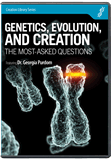
Not Only How Much, But Also How Fast: Gene Sequences
ScienceNOW: “The 1% Solution”
The inadequacy of similar “genetic potential” in explaining organisms’ similarity is perhaps most notable in comparisons of chimps and humans, as highlighted by a ScienceNOW article this week that reported on work published online in Nature Genetics. “If humans and chimps are 99% alike genetically, how come we're so different?” asks author Constance Holden, a question answered by the Bible long before the question was asked. (Of course, the 99% figure is an oft-stated inaccuracy—see Greater than 98% Chimp/human DNA similarity? Not any more.)
The latest research indicates that the physiological differences between chimp and human is caused “not in the proteins that genes produce but in the timing and level of gene activity.”
The latest research indicates that the physiological differences between chimp and human is caused “not in the proteins that genes produce but in the timing and level of gene activity.” Duke University researchers conducted the first-ever “genome-scale survey of promoter regions,” comparing gene sequences with “nonfunctional promoter sequences (DNA that by comparison with the chimp and macaque versions appears not to have been influenced by selection forces)” to establish which regions appear to have evolved quickly, a sign that the trait the regions promote are “favorable in human evolution.” Holden explains:
The researchers found that the promoter regions for about 575 human genes—especially genes involved in brain function and nutrition—have undergone this selection and are quite different in humans than in chimps.
Unsurprising but still important is the fact that many of the promoter regions that are the most different are “involved in neural development.” Duke postdoc Ralph Haygood also notes that that aspect of the discovery is “not surprising, given the vast differences in behavior and cognitive ability between chimps and humans.”
For evolutionists, this new research is centered around the idea that the differences in promoter regions are the result of evolution. For creationists, this new study reminds us that, despite some similarities, God made us different from apes not only genetically, developmentally, physiologically, and mentally, but also spiritually.
Remember, if you see a news story that might merit some attention, let us know about it! (Note: if the story originates from the Associated Press, Fox News, MSNBC, the New York Times, or another major national media outlet, we will most likely have already heard about it.) And thanks to all of our readers who have submitted great news tips to us.
(Please note that links will take you directly to the source. Answers in Genesis is not responsible for content on the websites to which we refer. For more information, please see our Privacy Policy.)
Recommended Resources

Answers in Genesis is an apologetics ministry, dedicated to helping Christians defend their faith and proclaim the good news of Jesus Christ.
- Customer Service 800.778.3390
- © 2024 Answers in Genesis




